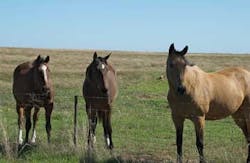Horse meat processing facility to be approved in New Mexico
There are always people who see businesses opportunities in the strangest places. While the scandal in Europe over horse meat pushed to the market as beef is still developing, a horse slaughtering plant may open in New Mexico and become the first authorized facility in the United States since 2007 to produce horse meat suitable for human consumption.
The facility in Roswell, N.M., is likely to be approved by the U.S. Department of Agriculture (USDA), after it sent word to Valley Meat Company that it was moving forward with processing its application to start horse slaughter operations, Rick de los Santos, a partner in the company, told ABC News. horse meat cannot be sold on the domestic market for human consumption but it can be exported to China and certain European countries where its consumption is legal.
Slaughtering horses and processing equine meat was banned in the United States in 2007, forcing owners to export their horses to be slaughtered in countries like Canada and Mexico. However, the ban was lifted more than a year ago when Congress left the activity out of a comprehensive spending bill.
Last year Valley Meat Company sued the USDA for not providing federal meat inspectors to its slaughterhouse. According to de los Santos, the company now expects at least two federal meat inspectors to start working at the processing facility "in the near future." It is expected that approval from the USDA will be granted within the next two months.
RELATED: Taco Bell ground beef found to contain horse DNA
In a press release, the USDA stated that it was against the slaughter of horses for meat but it had no choice but to send its inspectors to the facility and other plants that complied with all federal requirements. However, the department declined to provide further details about the reasons for opposing the slaughter of horses.
Previously, Valley Meat Company used to process beef but the owners decided that they needed to shift their focus to horse meat because the cattle market provided little opportunity for growth due to the drought, de los Santos explained. By contrast, there is little to no competition on the horse meat market. In fact, Valley Meat Company will be the first to operate in the United States. More than 130,000 horses were taken to Canada and Mexico to be slaughtered in 2012, de los Santos pointed out.
Federal regulations force slaughter houses to choose between cattle and horses, but not both. De los Santos said he believed this means that there is little risk of horse meat tainting the beef supply in the countries where it is sold and a situation similar to that in Europe is highly unlikely because the facility will comply with all federal standards.
He added that the public should have no concerns about the safety of horse meat because at present there are no records of potentially hazardous horse meat in the countries where it is sold and consumed.
